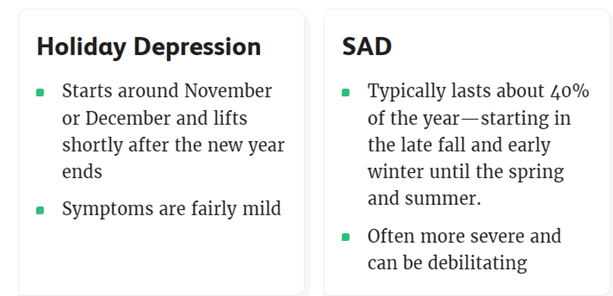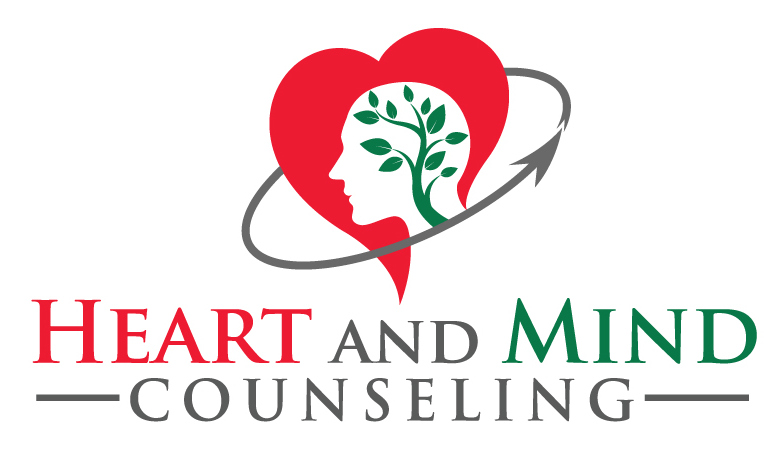Are Holiday Blues for Real?
Yes! The Holiday Season does not necessarily cause mental health issues, but the additional stress that the season brings can trigger feelings of sadness, depression and anxiety. In many situations, the individual may already be struggling with dealing with grief from the loss of a loved one, or stress from a life-changing event (illness or loss of a job). Feelings of isolation and loneliness can increase over the Holidays, especially if the individual does not have a solid support system of family and friends. Even people who love the Holidays can be affected. The added stress and pressure that the Holiday Season brings with planning dinners, buying presents, baking Christmas goodies, and attending events can leave people over-stressed and just exhausted.
Note: NAMI (National Alliance on Mental Illness) has found that 64% of people that have a mental illness said their conditions get worse around the holidays.
What are Causes of the Holiday Blues?
In some cases, it’s a personal reflection of goals that you may have set that are not met. Regrets, possible failures, and financial loss can all contribute to depression especially around the end of the year. Over-spending on gifts that you know you can’t afford creates additional financial stress. Many people are using credit cards to cover gift expenses leading to even more additional debt that they simply can’t afford.
Some people tend to overeat and use alcohol as a method to handle stress and/or sadness. These are unhealthy ways to try to deal with the stress and can make the depression symptoms even worse. Lack of sleep from the busyness of the season can also lead to higher stress levels.
Unrealistic expectations can increase depression or anxiety anytime during the year. It seems to have an even greater impact over the Holiday Season. The stores have holiday displays and decorations out even before Halloween! TV shows, movies, and advertisements all show how we are supposed to feel and act during the Season. Everyone is so happy – why aren’t I?
What can you do if someone you know is struggling?
Call a friend! Reach out and make plans to meet for lunch, dinner, coffee, etc. Let them know that you care and are thinking about them. Encourage them to talk about their struggles and really listen. If they cancel, reschedule with them. Even if you meet them at their home for coffee, they need to know that they matter. We all need to be reminded that things will get better, it takes time. Encourage them to find a therapist or a support group to help them learn how to better deal with their struggles.
If you are struggling
First, talk to your doctor. If you normally do not have depression symptoms, lifestyle changes may help you deal with the Christmas Blues. You do not have to say “Yes” to everything. It’s okay to say no to a commitment that will cause additional stress or put you in a difficult situation. Limit activities that may lead to overspending, overeating and excessive drinking.
For some people, loneliness can be triggering depression. Especially if you are grieving a loss, or away from your family during the Holidays. Try not to isolate yourself! It’s not always easy, but get yourself out of the house. Look for a local group to join (exercise program, walking group, card night, etc.) or volunteer for a community program that you would like to support.
Summary
Adults are not the only ones that can experience the Christmas Blues and/or SAD. Children are often affected. Parents, please pay attention to changes in your child’s behavior. A change in their normal routine, additional stress from the season, or missing friends are a few examples of what can cause holiday depression. If your child shows any symptoms, please talk to their doctor or therapist.
People think that the Christmas Blues will go away after the Holiday ends, so they just try to deal with the depression and/or anxiety on their own. That is not a good solution to handling any form of depression. Therapy can help provide skills that will help you all year round. Stress management, communication, positive thinking and identifying negative thought patterns that lead to depression, will help you both in the short and long-term.
More About Heart and Mind Counseling
Heart and Mind Counseling has therapists that specialize in ADHD, behavioral therapy, chronic illness and pain, domestic violence, self-esteem, depression, anxiety, inner conflict, relationship issues and negative relationship patterns. If you are being impacted in some of the ways above, contact us today so we can explore what it means for you. We can help you with your thought patterns, and emotions surrounding your self-perception, desires, expectations, realities of your relationships and life today!
Heart and Mind Counseling is a full-service Telehealth Psychotherapy service helping clients with a broad spectrum of needs in Michigan, Alabama, Colorado, Georgia, Florida, Iowa, Kansas, Massachusetts, New Jersey, Ohio, Oklahoma, Pennsylvania, Vermont, Texas, and Wisconsin.
Dr. Corinne Smorra, LCSW is trained in EMDR and specializes in therapy for patients and families dealing with congenital heart disease, chronic disease, anxiety, depression, organ transplant, end of life, and grief. For more information about Dr. Smorra and her research, please visit https://www.linkedin.com/in/ dr-corinne-smorra-dsw-msw.lcsw-439a9ba/ or www.heartandmindcounseling.com.
Catherine Nwora, MSN, APRN, PMHNP-BC, FNP-BC, Family Nurse, Psychiatric Mental Health Nurse Practitioner. She specializes in comprehensive psychiatric evaluations, identifying risk factors that might affect patient’s mental health, medication management, chronic illness and pain, crisis intervention, depression, diagnosis of children, adolescents and young adults with eating disorders and weight management. Catherine is licensed in the State of Michigan.
Brandy Goins, PhD (ABD), LPC certified in DBT, is a Licensed Sex Offender Treatment provider specializing in domestic and sexual abuse, addictions, chronic illness, chronic pain and trauma. She also specializes in a range of mental diagnoses such as schizophrenia, schizoaffective disorder, bipolar disorder, dissociative identity disorder. Ms. Goins also specializes in polyamorous, kink, LGTBQ+, transgender populations as well. Brandy is licensed in Florida, Michigan and Texas.
Lauren Thomas, LCSW is a trauma therapist Certified in Trauma Focused CBT and CPT. She specializes in trauma, chronic illness and pain, anxiety, depression, anger management, grief, pregnancy and child loss, and special needs children and their families. Lauren is licensed in Michigan and Florida.
Katie Dines, LCSW is trained in EMDR and specializes in self-esteem, depression, anxiety, substance abuse, inner conflict, relationship issues (domestic abuse, negative relationship patterns). Katie is licensed in Michigan.
Kennedy Boulis, LCSW is trained in DBT, does crisis counseling as well as specializing in ADHD, depression, anxiety, behavioral therapy for children, adolescent, family, and adult clients. Kennedy is licensed in Michigan.
References:
https://www.healthpartners.com/blog/why-we-get-depressed-during-holidays/
https://www.verywellmind.com/holiday-blues-4771716






